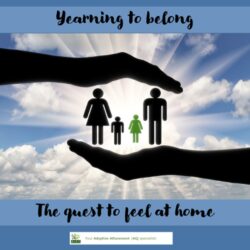Feeling short of time or finding it difficult to concentrate? You can listen to this post. Listening time: 5:49

Winter has arrived. Even here in South Florida temperatures have plummeted! Our instinct to hunker down drives us to turn to home for shelter, warmth, and safety. Home and family provide a reassuring sense of belonging. Home is far more than the physical structure in which we live; it is the interwoven relationships that provide physical and emotional sanctuary. When life overwhelms or circumstances challenge us, we look for this safe space. This kind of unconditional belonging is a fundamental human need.
When Sally Ankerfelt and I were writing What Adoptees Seek from Families and Faith, we interviewed many adult adoptees. . If we choose to listen, the insights and wisdom of adult adoptees can help us to be better parents, reduce the adoption-connected pain and trauma that our children might experience, and nurture a comforting sense of belonging in our families.
Each of their stories described a unique, individual narrative. Collectively they revealed some consistent themes. The most common theme was their profound yearning to belong, to feel that soul-deep sense of being “at home.”
This powerful need to belong was often paired with a painful awareness that they no longer “belonged” in their birth families. Most viewed their separation from their first family as rejection– one which they felt in a deeply personal way. Regardless of the justifications, pressures, heartbreaking factors, or “valid” reasons that propelled their mothers’ decision to choose adoption, adoptees felt anguish. As youths, they struggled to parse the painful reality that their mothers had been unable to find a way to make space for them in their lives. (Many continue to wrestle with the pain of this rejection throughout their adult lives.)
Many adoptees reported that they never quite fit in with their adoptive families. The underlying fear of precipitating a repetition of their first families’ rejections motivated adoptees to try to morph into whom they believed their adoptive parents wanted them to be.
They never quite measured up to the expectations of their adoptive parents nor could they ever quite embody the child their adoptive parents had fantasized in their imaginations. It is impossible to compete with a dream.
Sadder still, many adoptees reported that they felt obligated to suppress their true selves, to subordinate their natural interests and abilities, and instead to follow the historic family patterns, interests, and paths that their adoptive family had followed for generations. Thus, they were simultaneously not quite themselves and not quite who their parents dreamed. They did not fully feel “at home” in either their adoptive families or their birth families. Their sense of belonging remained elusive.
In this month that is often associated with love and sweetness, let us ponder some important questions:
- How are we nurturing our children’s authentic selves?
- How are we affirming and validating the realities of their life experiences?
- How are we sharing conversations about important conversations– even if awkward or difficult?
- How can we help our children to experience a secure sense of belonging in our families?
I saw a post on Facebook which offered a powerful suggestion: when someone comes to us, e.g., our children, ask them this question. Do you want me to listen or offer solutions? This simple question places the trajectory of the conversation firmly in the hands of the person/child who sought us out. It empowers them to define what they want from us. They set the parameters, not us. They don’t have to adjust to our instincts, they can assert their own and make a clear request. This is empowering. This sense of agency is healing and is one of the elements that build a sense of belonging. This also helps to diminish any learned helplessness and affirm their capacity to problem solve and feel capable of meeting life’s challenges. When parents “come to the rescue” too quickly or too often, kids internalize a powerful belief in their own lack of capability. This diminished sense of self reinforces feelings of shame, rejection, difference, and chips away at their sense of security, belonging, and feeling at home.
__________________________
- Call us at 1-800-653-9445
- Listen to our podcasts: Adoption Matters: Real People. Real Life. Real Talk and Essentials of Adoption Attuned Parenting
- Watch our YouTube channel
- Read Books written by our coaches
- Click to learn more about Adoption Attuned Certified coaching!


